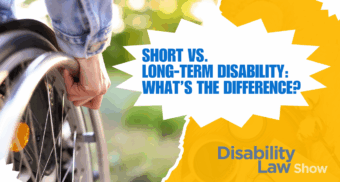Disability Law Show – Season 7 Episode 7
Episode Summary
DISABILITY CLAIMS AND ADDICTION QUICK Q&A on Season 7 Episode 07 of the Disability Law Show with Disability Lawyer and Partner James Fireman.
Watch above to discover the steps you must take when the insurance company cuts off or denies your long-term disability claim anywhere in Canada, on the only disability law show on TV and radio in the country.
Episode Notes
Pushed into new occupation by disability insurer
After two years on LTD, I was told by my insurer that a medical review had indicated that I could do sedentary work and that they’d found possible new jobs for me. I previously operated heavy machinery, but work was becoming impossible after a hip replacement and multiple accidents. What can I do?
- Change in definition of disability: After the first two years of long-term disability, under most policies, a change in the definition of “disabled” occurs. Claimants have to prove they can no longer work in any occupation, not just their own. Disability insurers often cut off benefits preemptively at this time despite a continued ability to work. Insurers must be able to find positions commensurate in income, but must also what the claimant has the skillset and training for.
Option to appeal a disability claim denial
After being on STD for many months, my treating psychiatrist determined that I was still unable to return to work. However, after applying for LTD, my claim was denied. I have the option to appeal, but I know that appeals can be drawn out and fruitless. Do I have any other options?
- Appeals process: The appeals process is generally not included in most long-term disability policies. It is a process created by the insurance company to ensure they maintain a level of control and influence over a claim. It is far more beneficial for claimants to pursue legal action with a disability lawyer to receive approval for disability benefits. Appeals are not conducted by external and independent parties.
Disability claims and addiction: Quick Q&A
- Suffering from addiction or substance abuse: Many individuals suffering from addiction or substance abuse are unaware that it is considered a disability and are unlikely to apply for disability benefits. Despite this, those suffering from this disability who are unable to work should and can apply for short or long-term disability benefits.
- Approval for LTD: Just like any other disability, claimants would have to prove their ongoing symptoms prevent them from working. The support of a doctor or specialist is necessary, as well as proof of pursuing and receiving the required treatment.
- Reasons for denial: Due to the nature of addiction, claimants often relapse or do not follow a linear recovery. Doctors and other treating medical professionals have acknowledged this. Insurers will still argue that relapse is a legitimate reason to end benefits. The social stigma surrounding addiction also contributes to denials of benefits.
Disabled with subjective ongoing symptoms
I was recently diagnosed with fibromyalgia and chronic fatigue. Despite regular visits to a chiropractor and osteopath, I haven’t seen any improvements over the past year. I worry that many of my symptoms might be considered subjective. Do I have any chance of being approved?
- Symptoms without a diagnosis: Claimants can strengthen their disability claims by seeking treatment and support from certain medical professionals, such as doctors or surgeons. Subjective medical conditions are still entitled to disability benefits. A diagnosis is not required to receive approval for benefits, unlike continued ongoing symptoms that prevent an individual from working.
Reasons for denying a mental health claim
I’m on short-term disability through my company due to severe anxiety and depression. My illness began after a long period of bullying and harassment by a coworker. Could my long-term disability claim be denied if the insurance company determines that my illness is hereditary?
- Invisible illnesses and disability benefits: Whether or not a condition is hereditary should not have any bearing on a disability claim’s approval. Mental health claims are often denied due to a lack of objective medical evidence, or considered “situational” if it arose as a result of workplace harassment. Mental illnesses can often become generalized despite the trigger.
PREVIOUS EPISODE: Disability Law Show S7 E6 – 3 Common mistakes to avoid when applying for LTD




